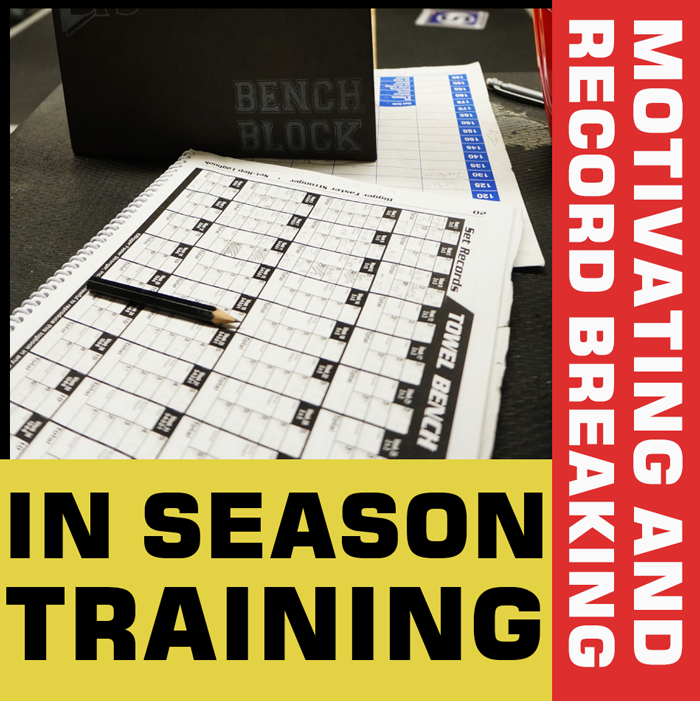You Must Train In-Season!

The mental and physical benefits of managing progress.
When looking through the BFS catalog, some coaches are surprised to see it continues to offer manual set-rep logbooks. After all, isn’t this the Information Age, where paper, in general, is following the path of vinyl records…and 8-track tapes…and cassette tapes, and CDs? Certainly, computer-aided workout systems, including our own Beat the Computer program and Set Rep Log App, have earned their place in athletic training and physical fitness programs. When coaches are working with large groups, the usual situation at high schools, computer systems such as these are essential in managing data to produce team and class ranking systems.
The Beat the Computer (BTC) and Set Rep Log App (SRLA) programs are particularly valuable because they give athletes specific goals each time they work out to help ensure continual progress – automatically producing athletic evaluation reports. Still, as will be explained later, there are good reasons to have athletes complete the original BFS Log-books by hand. The BTC, SRLA, and BFS Set-Rep Logbooks are all great for encouraging progress and making it easy to track. The fact that athletes can make progress every single workout is a major reason that coaches and PE teachers appreciate the BFS Total Program. More specifically, the program enables every athlete to make personal records, often several personal records, every single workout – even in season. This is in contrast to many of the periodization schemes.

Periodization vs. BFS
When BFS began developing its training system, news started trickling in about elaborate training programs called “periodization” developed by Eastern European coaches. Although the elaborate tables, charts, and graphs associated with these programs were certainly impressive, BFS immediately recognized the problems associated with such training systems.
While BFS recognized that for single-sport athletes these programs did have their advantages and were obviously successful, periodization programs were not practical when coaches were working with multiple-sport athletes at the high school level – especially those in team sports. First, these periodization programs usually focused on peaking for only a few competitions a year. If you’re a football coach, under this system which game would you peak for? The obvious answer is the state championship, but how do you get into the championship game if your players are in poor form during the playoffs? The periodization solution to this issue would be to go into a “maintenance” phase, but athletes don’t get bigger, faster, or stronger during maintenance workouts. Also, what about multi-sport athletes, which is what most high school and younger athletes are? How are athletes expected to get stronger if they are lifting light weights, year-round? The answer is that they can’t.
SAVE $50 ON WRSC ONLINE CERTIFICATION!
Inform your classes and reduce your liability in the weight room!
CALL 800-628-9737 TO BOOK AN IN-PERSON CERTIFICATION FOR YOUR ENTIRE TEACHING/COACHING STAFF
In addition to those problems, BFS found for a high school coach that it was difficult to motivate young athletes if they had to wait weeks to see progress. Rather than just keeping records for 1-repetition personal bests, BFS expanded the program to include personal records for multiple repetitions, total weight used in an exercise, and total weight used for all sets in an exercise. The result is that even when athletes have an off-day and can’t make a record in how much weight they use for a single lift, they can still set a record for the amount of work they perform.
Setting daily records have additional benefits, as was confirmed by Dr. David Schlenoff. A licensed psychologist and certified school psychologist in the Baltimore County Public School system, Dr. Schlenoff often works with students who have learning or emotional problems. Several years ago he had the opportunity to work with a girls-only high school weight training class that used the BFS Program. Schlenoff found that the girls worked hard and made great progress on the BFS Program; they also experienced unexpected benefits in their attitude.
Says Dr. Schlenoff, “What was even more noticeable was a palpable air of happiness that seemed to permeate the weight room as these girls eagerly awaited their opportunity to work out. They each seemed very proud of their progress. Perhaps this seeming happiness derives from learning how to set realistic, attainable goals and from reaching those goals. Perhaps it derives from being part of a group with a shared interest – we know that girls are typically more socially oriented than boys. Perhaps it derives from the endorphin release that has proven to be attributable to physical exercise – or maybe it’s just plain fun!” It feels great to check off individual items on a “to-do” list, and the same satisfaction occurs when young athletes physically write down their records. This is why the classic logbook has a special place in the BFS Program. Sometimes tried-and-true works best.

Dr. David Schlenoff, psychologist, Baltimore County Public Schools Dr. Schlenoff is a licensed psychologist and certified school psychologist and is BFS certified. He has served as a psychological consultant to Runner’s World magazine, has published material on the role of a therapeutic running program in rehabilitation, on jogging therapy for psychiatric inpatients, and on numerous other topics.
Read More About How BFS Helps Schools Succeed:
"Experience and Execution at Mountain Ridge High School"
